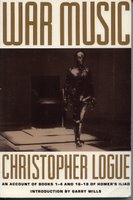Other Ingredients
To make a perfect fish menu,
The witches found they had to place
Upon this alcoholic base
Great stacks of food and spices too.
Of all the things most edible
On which the souls of fish have dined,
That fish would sell their souls to find,
Most gracious to their sense of smell,
Is flesh exotic to their kind:—
Cold-blooded things yet not marine,
And not of earth, but half-between,
That live enclosed within the sand
Without the power of locomotion,
And mammal breeds whose blood is hot,
That court the sea but love it not,
That need the air but not the land,—
The Laodiceans of the ocean.
So in this spacious cauldron went
Cargoes of food and condiment.
Oysters fished from Behring Strait
Were brought and thrown in by the crate;
Spitzbergen scallops on half-shell,
Mussels, starfish, clams as well,
Limpets from the Hebrides,
Shrimps and periwinkles, these,
So celebrated as a stew,
Were meant to flavour up the brew.
Then for the more substantial fare,
The curried quarter of a tail
Hewn from a stranded Greenland whale,
A liver from a Polar bear,
A walrus’ heart and pancreas,
A blind Auk from the coast of Java,
A bull moose that had died from gas
While eating toadstools near Ungava,
One bitter-cold November day;
Five sea-lion cubs were then thrown in,
Shot by the Cretan’s javelin
In a wild fight off Uruguay,
With flippers fresh from the Azores,
Fijian kidneys by the scores,
Together with some pollywogs,
And kippered hocks of centipedes,
And the hind legs of huge bull frogs
Raked by the millions from the reeds
Of slimy Patagonian bogs.
Then before the copper lid
Was jammed upon the pyramid,
The sisters scattered on the top
Many a juicy lollipop;
Tongues from the Ganges crocodile,
Spawn from the delta of the Nile,
Hoofs of sheep and loins of goats,
Raised from foundered cattle-boats—
Titbits they knew might blend with hops,
Might strengthen rum or season rye,
From Zulu hams and Papuan chops
To filets mignons from Shanghai.
Now while volcanic fires burned,
Making the cauldron fiercely hot,
Lulu with her ladle churned
The pungent contents of the pot,
From which distinctive vapours soon
Rose palpably before the view.
Then Ardath summoned a typhoon
Which as it swooped upon the stew,
And swept around the compass, bore
To every sea and every shore
The tidings of the witches’ Feast.
And from the West and from the East,
And from the South and from the North,
From every bay and strait and run,
From the Tropics to the Arctic sun,
The Parliament of fish came forth,
Lured by a smell surpassing far
The potencies of boiling tar,
For essences were in this brew
Unknown to blubber or to glue,
And unfamiliar to the nose
Of sailors hardened as they are
To every unctuous wind that blows
From Nantucket to Baccalieu.
The crudest oil one ever lit
Was frankincense compared to it.
It entered Hades, and the airs
Resuscitated the Immortals;
It climbed the empyrean stairs
And drove St. Peter from the portals.
E. J. Pratt
The Mumbling Jack precursor. Occasional thoughts on Baseball, Poetry, Art, Music, and other Obsessions real or imagined. Follow my new Mumbling Jack blog at the link below.
Follow Mumbling Jack, my new blog
-
See You Where the Orchids Bloom - See You Where the Orchids Bloom I tell myself now that you’re goneand I didn’t see you at the endthat you never were one for goodbyesanyways, all the linge...3 days ago
Sunday, April 30, 2006
Other Ingredients (E. J. Pratt)
Saturday, April 29, 2006
A Book in the Ruins (Czeslaw Milosz)
update: The URL of the file has changed because I replaced it with an amplified version. I've fixed the above link to direct people to the new version.
A Book in the Ruins
A dark building. Crossed boards, nailed up, create
A barrier at the entrance, or a gate
When you go in. Here, in the gutted foyer,
The ivy snaking down the walls is wire
Dangling. And, over there, the twisted metal
Columns rising from the undergrowth of rubble
Are tattered tree trunks. This could be the brick
Of the library, you don't know yet, or the sick
Grove of dry white aspen where, stalking birds,
You met a Lithuanian dusk stirred
From its silence only by the wails of hawks.
Now walk carefully. You see whole blocks
Of ceiling caved in by a recent blast.
And above, through jagged tiers of plaster,
A patch of blue. Pages of books lying
Scattered at your feet are like fern-leaves hiding
A moldy skeleton, or else fossils
Whitened by the secrets of Jurassic shells.
A remnant life so ancient and unknown
Compels a scientist, tilting a stone
Into the light, to wonder. He can't know
Whether it is some dead epoch's shadow
Or a living form. He looks again
At chalk spirals eroded by the rain,
The rust of tears. Thus, in a book picked up
From the ruins, you see a world erupt
And glitter with its distant sleepy past,
Green times of creatures tumbled to the vast
Abyss and backward: the brows of women,
An earring fixed with trembling hand, pearl button
On a glove, candelabra in the mirror.
The lanterns have been lit. A first shiver
Passes over the instruments. The quadrille
Begins to curl, subdued by the rustle
Of big trees swaying in the formal park.
She slips outside, her shawl floating in the dark,
And meets him in a bower overgrown
With vines, They sit close on a bench of stone
And watch the lanterns glowing in the jasmine.
Or here, this stanza: you hear a goose pen
Creak, the butterfly of an oil lamp
Flutters slowly over scrolls and parchment,
A crucifix, bronze busts. The lines complain
In plangent rhythms, that desire is vain.
Here a city rises. In the market square
Signboards clang, a stagecoach rumbles in to scare
A flock of pigeons up. Under the town clock,
In the tavern, a hand pauses in the stock
Gesture of arrest — meanwhile workers walk
Home from the textile mill, townsfolk talk
On the steps—and the hand moves now to evoke
The fire of justice, a world gone up in smoke,
The voice quavering with the revenge of ages.
So the world seems to drift from these pages
Like the mist clearing on a field at dawn.
Only when two times, two forms are drawn
Together and their legibility
Disturbed, do you see that immortality
Is not very different from the present
And is for its sake. You pick a fragment
Of grenade which pierced the body of a song
On Daphnis and Chloe. And you long,
Ruefully, to have a talk with her,
As if it were what life prepared you for.
—How is it, Chloe, that your pretty skirt
Is torn so badly by the winds that hurt
Real people, you who, in eternity, sing
The hours, sun in your hair appearing
And disappearing? How is it that your breasts
Are pierced by shrapnel, and the oak groves burn,
While you, charmed, not caring at all, turn
To run through forests of machinery and concrete
And haunt us with the echoes of your feet',
If there is such an eternity, lush
Though short-lived, that's enough. But how ... hush!
We were predestined to live when the scene
Grows dim and the outline of a Greek ruin
Blackens the sky. It is noon, and wandering
Through a dark building, you see workers sitting
Down to a fire a narrow ray of sunlight
Kindles on the floor. They have dragged out
Heavy books and made a table of them
And begun to cut their bread. In good time
A tank will clatter past, a streetcar chime.
Czeslaw Milosz, Warsaw, 1941
(This is the first audio file I've actually recorded on my computer, instead of having to record by telephone. The reading isn't perfect, but the quality is much better than audioblogger stuff I have been doing. For software, I used Audacity, an open source program. For hardware, a Shure SM57 microphone and the Behringer TUBE ULTRAGAIN MIC200 pre-amp. Many thanks to John Mullins, Pat Deighan, and Dan Wagner for the loan of the hardware.)
Thursday, April 27, 2006
Write a Fib, Win a Pair of Web Cams
IWhatis.com is running a little poetry contest of sorts. Write the winning fib (with a tech reference), which seems to be a six line poem using the first six fibonacci numbers to determine the number of syllables per line. According to the NY Times, the form was created by Gregory Pincus as a writing exercise.
do
declare,
this old web
will snare the strangest
little marriages of mind and
math-a-matics, of machine and human languages.
Tuesday, April 25, 2006
Unsteady Eddie and the Lost-At-Sea Mariners
At least they have a few bright spots in Young King Felix, who is very close to becoming one of baseball's top five pitchers, and relievers Rafael Soriano and J.J. Putz — who saw Putz' start to the season coming? It looks real, though, judging by his strikeout and walk numbers. Despite slow starts, Richie Sexson and Ichiro are real hitters and can both be counted on to end the season with reasonable facsimiles of their average numbers over 162 games. Kenji Johjima helps, too.
Monday, April 24, 2006
Sore Throat
Sunday, April 23, 2006
Three Audio Poems
Saturday, April 22, 2006
Poem Request Week
Sunday Morning (parts I-IV), Wallace Stevens.
Sunday Morning (parts V-VIII), Wallace Stevens.
Love Song: I and Thou, Alan Dugan.
LOVE SONG: I AND THOU
Nothing is plumb, level or square:
Alan Dugan
the studs are bowed, the joists
are shaky by nature, no piece fits
any other piece without a gap
or pinch, and bent nails
dance all over the surfacing
like maggots. By Christ
I am no carpenter. I built
the roof for myself, the walls
for myself, the floors
for myself, and got
hung up in it myself. I
danced with a purple thumb
at this house-warming, drunk
with my prime whiskey: rage.
Oh, I spat rage's nails
into the frame-up of my work:
it held. It settled plumb,
level, solid, square and true
for that great moment. Then
it screamed and went on through,
skewing as wrong the other way.
God damned it. This is hell,
but I planned it, I sawed it,
I nailed it, and I
will live in it until it kills me.
I can nail my left palm
to the left-hand crosspiece but
I can't do everything myself.
I need a hand to nail the right,
a help, a love, a you, a wife.
Later today, a look — literally — at some books of which I'm particularly fond.
update: I'm going to keep this post at the top of the page for a while.
update: I will post three requested poems tomorrow: Poe's The Conqueror Worm; Stevens' Sunday Morning; and Alan Dugan's Love Song: I and Thou. I may do the first one when I get home from work tonight, depending upon how I feel. I'll continue to keep this post at the top of the page.
update: I've decided it would be most convenient for everyone if I place the requested poems at the top of this post as I do them.
Thursday, April 20, 2006
Miscellaneous stuff
Some open source programs for windows. A CD of open source stuff.
The, ahem, Anagram Hall of Fame.
Yeti Crabs. No, it has nothing to with the perils of sex with a mythical Himalayan primate. It's a recently discovered crustacean.Desperation = A Rope Ends It
The Morse Code = Here Come Dots
The Meaning of Life = The fine game of nil
Slot Machines = Cash Lost in'em
The Mind and Machine Module. Lots of brain stuff. Remember: your brain is your greatest enemy. Get to know your enemy. Learn to out-think it.
Wednesday, April 19, 2006
Tuesday, April 18, 2006
And that's the ballgame
Mermaid (Robert Lowell)
So, below is Robert Lowell's Mermaid, originally published in his 1973 collection, The Dolphin. More about Lowell can be found at this link.) Apparently, Lady Caroline Blackwood (more here), to whom Lowell was married at the time, is the mermaid of the title and figues strongly in the whole collection. Interestingly, to me, at least, Blackwood was previously married to the artist Lucien Freud — who, while he's no slouch as a painter himself, was a friend of possibly the greatest painter of the 20th century, Francis Bacon (be sure to check out the Bacon paintings linked to in that article). And they were nutbars all, bless the large-brained lot of 'em.
As usual, in lieu of taking up much space writing about the poem itself, I have scattered links throughout to show what associations were made in "my tiny, mad, chicken mind" (that link is unrelated to anything else in this post — I think).
Mermaid
1
I have learned what I wanted from the mermaid
and her singeing conjunction of tail and grace.
Deficiency served her. What else could she do?
Failure keeps snapping up transcendence,
bubble and bullfrog boating on the surface,
belly lustily lagging three inches lowered—
the insatiable fiction of desire.
None swims with her and breathes the air.
A mermaid flattens soles and picks a trout,
knife and fork in chainsong at the spine,
weeps white rum undetectable from tears.
She kills more bottles than the ocean sinks,
and serves her winded lovers' bones in brine,
nibbled at recess in the marathon.
3
Our meetings are no longer like a screening;
I see the nose on my face is just a nose,
your bel occhi grandi are just eyes
in the photo of you arranged as figurehead
or mermaid on the prow of a Roman dory,
bright as the morning star or a blond starlet.
Our twin black and tin Ronson butane lighters
knock on the sheet, are what they are,
too many, and burned too many cigarettes. . .
Night darkens without your necessary call,
it's time to turn your pictures to the wall;
your moon-eyes water and your nervous throat
gruffs my directive, "You must go now go."
Contralto mermaid, and stone-deaf at will.
4
I see you as a baby killer whale,
free to walk the seven seas for game,
warmhearted with an undercoat of ice,
a nerve-wrung back . . . all muscle, youth, intention,
and skill expended on a lunge or puncture—
hoisted now from conquests and salt sea
to flipper-flapper in a public tank,
big deal for Sunday children. . . . . My blind love—
on the Via Veneto, a girl
counting windows in a glass cafe,
now frowning at her menu, now counting out
neanderthals flashed like shorebait on the walk. . . .
Your stamina as inside-right at school
spilled the topheavy boys, and keeps you pure.
5
One wondered who would see and date you next,
and grapple for the danger of your hand.
Will money drown you? Poverty, though now
in fashion, debases women as much as wealth.
You use no scent, dab brow and lash with shoeblack,
willing to face the world without more face.
I've searched the rough black ocean for you,
and saw the turbulence drop dead for you,
always lovely, even for those who had you,
Rough Slitherer in your grotto of haphazard.
I lack manhood to finish the fishing trip.
Glad to escape beguilement and the storm,
I thank the ocean that hides the fearful mermaid—
like God, I almost doubt if you exist.
Robert Lowell
Part 2 is missing because I'm working from Lowell's Selected Poems which does
 not have Part 2.
not have Part 2.Here's another Lowell poem, Water. And an Elizabeth Bishop poem, North Haven, written for Lowell. As you can see, there's "water, water everywhere."
Monday, April 17, 2006
Birches (Robert Frost)
Update: I had to redo Birches because the first version never showed up.
I've noticed that these posts don't work very well when I try to listen to them in my browser — they get truncated somehow. But they work just fine when I open the URL in a media player like QuickTime or Winamp. Ah well.
History (Robert Lowell)
Don't hear much about Lowell these days. Of course, I'm so much to myself lately that I don't hear much about anything. Whatever ... Lowell's good reading for a wet April night when you can hear green hissing and crawling up into everything that grows while last year's leaves sink into the soil, and branches fallen from winter-ravaged trees scrawl, mindless as an I Ching casting, across the ground.
HistoryHistory has to live with what was here,
clutching and close to fumbling all we had—
it is so dull and gruesome how we die,
unlike writing, life never finishes.
Abel was finished; death is not remote,
a flash-in-the-pan electrifies the skeptic,
his cows crowding like skulls against high-voltage wire,
his baby crying all night like a new machine.
As in our Bibles, white-faced, predatory,
the beautiful, mist-drunken hunter's moon ascends—
a child could give it a face: two holes, two holes,
my eyes, my mouth, between them a skull's no-nose—
O there's a terrifying innocence in my face
drenched with the silver salvage of the mornfrost.
Robert Lowell
Like the best of Lowell's work, this poem never tries to excuse or explain itself. Unconcerned with anything, even the question of its own truthfulness, it is simply there with its own blood on its hands, looking beyond you. Any questions you find here are yours. And any answers.



















